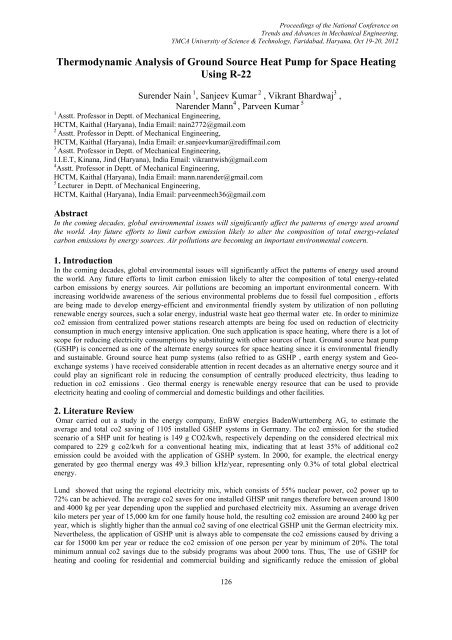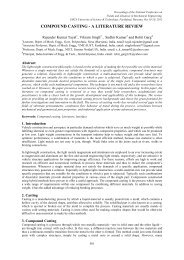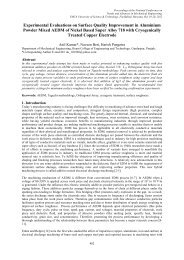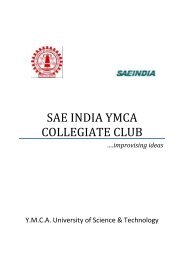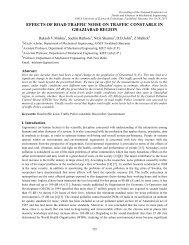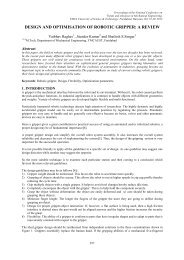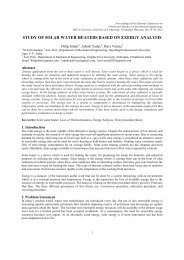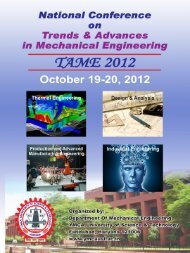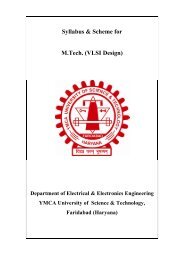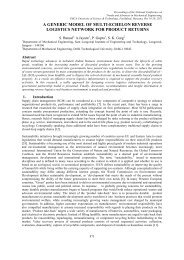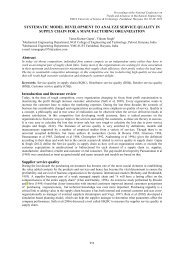- Page 2 and 3:
NATIONAL CONFERENCE ON TRENDS AND A
- Page 4 and 5:
National Conference on Trends and A
- Page 6 and 7:
National Conference on Trends and A
- Page 8:
National Conference on Trends and A
- Page 15 and 16:
MESSAGE I am pleased to learn that
- Page 17 and 18:
Sr. No Proceedings of National Conf
- Page 19 and 20:
Proceedings of National Conference
- Page 21 and 22:
Proceedings of National Conference
- Page 23:
Proceedings of National Conference
- Page 27:
Akash Equipments & Machineries (P)
- Page 31 and 32:
Proceedings of the National Confere
- Page 33 and 34:
Proceedings of the National Confere
- Page 35 and 36:
Proceedings of the National Confere
- Page 37 and 38:
Proceedings of the National Confere
- Page 39 and 40:
Proceedings of the National Confere
- Page 41 and 42:
Proceedings of the National Confere
- Page 43 and 44:
Proceedings of the National Confere
- Page 45 and 46:
Proceedings of the National Confere
- Page 47 and 48:
Proceedings of the National Confere
- Page 49 and 50:
Proceedings of the National Confere
- Page 51 and 52:
Proceedings of the National Confere
- Page 53 and 54:
Proceedings of the National Confere
- Page 55 and 56:
Proceedings of the National Confere
- Page 57 and 58:
Proceedings of the National Confere
- Page 59 and 60:
Proceedings of the National Confere
- Page 61 and 62:
Proceedings of the National Confere
- Page 63 and 64:
Proceedings of the National Confere
- Page 65 and 66:
Proceedings of the National Confere
- Page 67 and 68:
Proceedings of the National Confere
- Page 69 and 70:
Proceedings of the National Confere
- Page 71 and 72:
Proceedings of the National Confere
- Page 73 and 74:
Proceedings of the National Confere
- Page 75 and 76:
Proceedings of the National Confere
- Page 77 and 78:
Proceedings of the National Confere
- Page 79 and 80:
3. MATHEMATICAL FORMULATION Proceed
- Page 81 and 82:
Proceedings of the National Confere
- Page 83 and 84:
Proceedings of the National Confere
- Page 85 and 86:
Proceedings of the National Confere
- Page 87 and 88:
Proceedings of the National Confere
- Page 89 and 90:
Before mounting electro turbo gener
- Page 91 and 92:
Proceedings of the National Confere
- Page 93 and 94:
Proceedings of the National Confere
- Page 95 and 96:
Proceedings of the National Confere
- Page 97 and 98:
Proceedings of the National Confere
- Page 99 and 100:
Proceedings of the National Confere
- Page 101 and 102:
Proceedings of the National Confere
- Page 103 and 104:
Proceedings of the National Confere
- Page 105 and 106: Proceedings of the National Confere
- Page 107 and 108: Proceedings of the National Confere
- Page 109 and 110: Proceedings of the National Confere
- Page 111 and 112: Proceedings of the National Confere
- Page 113 and 114: Proceedings of the National Confere
- Page 115 and 116: Proceedings of the National Confere
- Page 117 and 118: Proceedings of the National Confere
- Page 119 and 120: Proceedings of the National Confere
- Page 121 and 122: Proceedings of the National Confere
- Page 123 and 124: Proceedings of the National Confere
- Page 125 and 126: Proceedings of the National Confere
- Page 127 and 128: Proceedings of the National Confere
- Page 129 and 130: Proceedings of the National Confere
- Page 131 and 132: Proceedings of the National Confere
- Page 133 and 134: Proceedings of the National Confere
- Page 135 and 136: Proceedings of the National Confere
- Page 137 and 138: Proceedings of the National Confere
- Page 139 and 140: Proceedings of the National Confere
- Page 141 and 142: Proceedings of the National Confere
- Page 143 and 144: Proceedings of the National Confere
- Page 145 and 146: Proceedings of the National Confere
- Page 147 and 148: Proceedings of the National Confere
- Page 149 and 150: Proceedings of the National Confere
- Page 151 and 152: Proceedings of the National Confere
- Page 153 and 154: Input of Station = Energy sent out
- Page 155: Proceedings of the National Confere
- Page 159 and 160: Proceedings of the National Confere
- Page 161 and 162: Proceedings of the National Confere
- Page 163 and 164: Proceedings of the National Confere
- Page 165 and 166: Proceedings of the National Confere
- Page 167 and 168: Proceedings of the National Confere
- Page 169 and 170: Proceedings of the National Confere
- Page 171 and 172: Proceedings of the National Confere
- Page 173 and 174: Proceedings of the National Confere
- Page 175 and 176: Proceedings of the National Confere
- Page 177 and 178: Proceedings of the National Confere
- Page 179 and 180: Proceedings of the National Confere
- Page 181 and 182: Proceedings of the National Confere
- Page 183 and 184: Proceedings of the National Confere
- Page 185 and 186: Proceedings of the National Confere
- Page 187 and 188: Proceedings of the National Confere
- Page 189 and 190: Proceedings of the National Confere
- Page 191 and 192: Proceedings of the National Confere
- Page 193 and 194: Proceedings of the National Confere
- Page 195 and 196: Proceedings of the National Confere
- Page 197 and 198: Proceedings of the National Confere
- Page 199 and 200: Proceedings of the National Confere
- Page 201 and 202: Proceedings of the National Confere
- Page 203 and 204: Proceedings of the National Confere
- Page 205 and 206: Proceedings of the National Confere
- Page 207 and 208:
Proceedings of the National Confere
- Page 209 and 210:
Proceedings of the National Confere
- Page 211 and 212:
Proceedings of the National Confere
- Page 213 and 214:
Proceedings of the National Confere
- Page 215 and 216:
Proceedings of the National Confere
- Page 217 and 218:
γ = Specific heat ratio λ = Fuel-
- Page 219 and 220:
Proceedings of the National Confere
- Page 221 and 222:
Proceedings of the National Confere
- Page 223 and 224:
Proceedings of the National Confere
- Page 225 and 226:
Proceedings of the National Confere
- Page 227 and 228:
Proceedings of the National Confere
- Page 229 and 230:
Proceedings of the National Confere
- Page 231 and 232:
Proceedings of the National Confere
- Page 233 and 234:
Proceedings of the National Confere
- Page 235 and 236:
Proceedings of the National Confere
- Page 237 and 238:
Proceedings of the National Confere
- Page 239 and 240:
Proceedings of the National Confere
- Page 241 and 242:
Proceedings of the National Confere
- Page 243 and 244:
Proceedings of the National Confere
- Page 245 and 246:
Proceedings of the National Confere
- Page 247 and 248:
Proceedings of the National Confere
- Page 249 and 250:
Proceedings of the National Confere
- Page 251 and 252:
Proceedings of the National Confere
- Page 253 and 254:
Proceedings of the National Confere
- Page 255 and 256:
Proceedings of the National Confere
- Page 257 and 258:
Proceedings of the National Confere
- Page 259 and 260:
Proceedings of the National Confere
- Page 261 and 262:
Proceedings of the National Confere
- Page 263 and 264:
Proceedings of the National Confere
- Page 265 and 266:
Proceedings of the National Confere
- Page 267 and 268:
Proceedings of the National Confere
- Page 269 and 270:
Proceedings of the National Confere
- Page 271 and 272:
Proceedings of the National Confere
- Page 273 and 274:
Proceedings of the National Confere
- Page 275 and 276:
Proceedings of the National Confere
- Page 277 and 278:
Proceedings of the National Confere
- Page 279 and 280:
Proceedings of the National Confere
- Page 281 and 282:
Proceedings of the National Confere
- Page 283 and 284:
Proceedings of the National Confere
- Page 285 and 286:
Proceedings of the National Confere
- Page 287 and 288:
Proceedings of the National Confere
- Page 289 and 290:
Proceedings of the National Confere
- Page 291 and 292:
{ i } + K { i } λi [ ]{ i } + λi
- Page 293 and 294:
Proceedings of the National Confere
- Page 295 and 296:
Proceedings of the National Confere
- Page 297 and 298:
Proceedings of the National Confere
- Page 299 and 300:
Proceedings of the National Confere
- Page 301 and 302:
Proceedings of the National Confere
- Page 303 and 304:
Proceedings of the National Confere
- Page 305 and 306:
Proceedings of the National Confere
- Page 307 and 308:
Proceedings of the National Confere
- Page 309 and 310:
Proceedings of the National Confere
- Page 311 and 312:
Proceedings of the National Confere
- Page 313 and 314:
Proceedings of the National Confere
- Page 315 and 316:
⎡⎛ 1+ δ ⎞ ⎛1− δ ⎞ = c
- Page 317 and 318:
Proceedings of the National Confere
- Page 319 and 320:
Proceedings of the National Confere
- Page 321 and 322:
Proceedings of the National Confere
- Page 323 and 324:
Proceedings of the National Confere
- Page 325 and 326:
Proceedings of the National Confere
- Page 327 and 328:
Proceedings of the National Confere
- Page 329 and 330:
Proceedings of the National Confere
- Page 331 and 332:
Proceedings of the National Confere
- Page 333 and 334:
Proceedings of the National Confere
- Page 335 and 336:
Proceedings of the National Confere
- Page 337 and 338:
Proceedings of the National Confere
- Page 339 and 340:
Proceedings of the National Confere
- Page 341 and 342:
Proceedings of the National Confere
- Page 343 and 344:
Proceedings of the National Confere
- Page 345 and 346:
Proceedings of the National Confere
- Page 347 and 348:
Proceedings of the National Confere
- Page 349 and 350:
Proceedings of the National Confere
- Page 351 and 352:
Proceedings of the National Confere
- Page 353 and 354:
Proceedings of the National Confere
- Page 355 and 356:
Proceedings of the National Confere
- Page 357 and 358:
OUTPUT Proceedings of the National
- Page 359 and 360:
Proceedings of the National Confere
- Page 361 and 362:
Proceedings of the National Confere
- Page 363 and 364:
Proceedings of the National Confere
- Page 365 and 366:
Proceedings of the National Confere
- Page 367 and 368:
Proceedings of the National Confere
- Page 369 and 370:
Proceedings of the National Confere
- Page 371 and 372:
Proceedings of the National Confere
- Page 373 and 374:
Proceedings of the National Confere
- Page 375 and 376:
Proceedings of the National Confere
- Page 377 and 378:
Proceedings of the National Confere
- Page 379 and 380:
Proceedings of the National Confere
- Page 381 and 382:
Proceedings of the National Confere
- Page 383 and 384:
Proceedings of the National Confere
- Page 385 and 386:
Proceedings of the National Confere
- Page 387 and 388:
Proceedings of the National Confere
- Page 389 and 390:
Proceedings of the National Confere
- Page 391 and 392:
Proceedings of the National Confere
- Page 393 and 394:
Proceedings of the National Confere
- Page 395 and 396:
Proceedings of the National Confere
- Page 397 and 398:
Proceedings of the National Confere
- Page 399 and 400:
Proceedings of the National Confere
- Page 401 and 402:
Proceedings of the National Confere
- Page 403 and 404:
Proceedings of the National Confere
- Page 405 and 406:
Proceedings of the National Confere
- Page 407 and 408:
Proceedings of the National Confere
- Page 409 and 410:
Proceedings of the National Confere
- Page 411 and 412:
Proceedings of the National Confere
- Page 413 and 414:
Proceedings of the National Confere
- Page 415 and 416:
Proceedings of the National Confere
- Page 417 and 418:
jωT / 2 e [ 2 j sin( ωT / 2) ] [
- Page 419 and 420:
Proceedings of the National Confere
- Page 421 and 422:
Proceedings of the National Confere
- Page 423 and 424:
Proceedings of the National Confere
- Page 425 and 426:
Proceedings of the National Confere
- Page 427 and 428:
Proceedings of the National Confere
- Page 429 and 430:
Proceedings of the National Confere
- Page 431 and 432:
Proceedings of the National Confere
- Page 433 and 434:
Proceedings of the National Confere
- Page 435 and 436:
Proceedings of the National Confere
- Page 437 and 438:
Proceedings of the National Confere
- Page 439 and 440:
Proceedings of the National Confere
- Page 441 and 442:
Proceedings of the National Confere
- Page 443 and 444:
Proceedings of the National Confere
- Page 445 and 446:
Proceedings of the National Confere
- Page 447 and 448:
Proceedings of the National Confere
- Page 449 and 450:
Proceedings of the National Confere
- Page 451 and 452:
6.2 Effect of input factors on Surf
- Page 453 and 454:
Proceedings of the National Confere
- Page 455 and 456:
Proceedings of the National Confere
- Page 457 and 458:
Proceedings of the National Confere
- Page 459 and 460:
Proceedings of the National Confere
- Page 461 and 462:
Proceedings of the National Confere
- Page 463 and 464:
Proceedings of the National Confere
- Page 465 and 466:
Proceedings of the National Confere
- Page 467 and 468:
Proceedings of the National Confere
- Page 469 and 470:
Proceedings of the National Confere
- Page 471 and 472:
Proceedings of the National Confere
- Page 473 and 474:
Proceedings of the National Confere
- Page 475 and 476:
Proceedings of the National Confere
- Page 477 and 478:
( ∏d i ) n The d i Proceedings of
- Page 479 and 480:
Proceedings of the National Confere
- Page 481 and 482:
Proceedings of the National Confere
- Page 483 and 484:
Proceedings of the National Confere
- Page 485 and 486:
Proceedings of the National Confere
- Page 487 and 488:
Proceedings of the National Confere
- Page 489 and 490:
Proceedings of the National Confere
- Page 491 and 492:
Proceedings of the National Confere
- Page 493 and 494:
Proceedings of the National Confere
- Page 495 and 496:
Proceedings of the National Confere
- Page 497 and 498:
Proceedings of the National Confere
- Page 499 and 500:
Proceedings of the National Confere
- Page 501 and 502:
1 Proceedings of the National Confe
- Page 503 and 504:
Proceedings of the National Confere
- Page 505 and 506:
Proceedings of the National Confere
- Page 507 and 508:
Proceedings of the National Confere
- Page 509 and 510:
Proceedings of the National Confere
- Page 511 and 512:
Proceedings of the National Confere
- Page 513 and 514:
Proceedings of the National Confere
- Page 515 and 516:
Proceedings of the National Confere
- Page 517 and 518:
Proceedings of the National Confere
- Page 519 and 520:
Proceedings of the National Confere
- Page 521 and 522:
Proceedings of the National Confere
- Page 523 and 524:
Proceedings of the National Confere
- Page 525 and 526:
Proceedings of the National Confere
- Page 527 and 528:
Proceedings of the National Confere
- Page 529 and 530:
Proceedings of the National Confere
- Page 531 and 532:
Proceedings of the National Confere
- Page 533 and 534:
Proceedings of the National Confere
- Page 535 and 536:
3 Al-Al Compound Casting using high
- Page 537 and 538:
7 Mg shell and Al core Disintegrat
- Page 539 and 540:
Proceedings of the National Confere
- Page 541 and 542:
Proceedings of the National Confere
- Page 543 and 544:
Proceedings of the National Confere
- Page 545 and 546:
Proceedings of the National Confere
- Page 547 and 548:
Proceedings of the National Confere
- Page 549 and 550:
Proceedings of the National Confere
- Page 551 and 552:
Proceedings of the National Confere
- Page 553 and 554:
Proceedings of the National Confere
- Page 555 and 556:
Proceedings of the National Confere
- Page 557 and 558:
Proceedings of the National Confere
- Page 559 and 560:
Proceedings of the National Confere
- Page 561 and 562:
Proceedings of the National Confere
- Page 563 and 564:
Proceedings of the National Confere
- Page 565 and 566:
Proceedings of the National Confere
- Page 567 and 568:
Proceedings of the National Confere
- Page 569 and 570:
Proceedings of the National Confere
- Page 571 and 572:
Proceedings of the National Confere
- Page 573 and 574:
Proceedings of the National Confere
- Page 575 and 576:
Proceedings of the National Confere
- Page 577 and 578:
Proceedings of the National Confere
- Page 579 and 580:
Proceedings of the National Confere
- Page 581 and 582:
Proceedings of the National Confere
- Page 583 and 584:
Proceedings of the National Confere
- Page 585 and 586:
Proceedings of the National Confere
- Page 587 and 588:
Proceedings of the National Confere
- Page 589 and 590:
Proceedings of the National Confere
- Page 591 and 592:
Proceedings of the National Confere
- Page 593 and 594:
Proceedings of the National Confere
- Page 595 and 596:
Proceedings of the National Confere
- Page 597 and 598:
Proceedings of the National Confere
- Page 599 and 600:
Proceedings of the National Confere
- Page 601 and 602:
1 Proceedings of the National Confe
- Page 603 and 604:
Proceedings of the National Confere
- Page 605 and 606:
Proceedings of the National Confere
- Page 607 and 608:
Proceedings of the National Confere
- Page 609 and 610:
Proceedings of the National Confere
- Page 611 and 612:
Proceedings of the National Confere
- Page 613 and 614:
Proceedings of the National Confere
- Page 615 and 616:
Proceedings of the National Confere
- Page 617 and 618:
Proceedings of the National Confere
- Page 619 and 620:
Proceedings of the National Confere
- Page 621 and 622:
Proceedings of the National Confere
- Page 623 and 624:
Proceedings of the National Confere
- Page 625 and 626:
Proceedings of the National Confere
- Page 627 and 628:
Proceedings of the National Confere
- Page 629 and 630:
Proceedings of the National Confere
- Page 631 and 632:
Proceedings of the National Confere
- Page 633 and 634:
Proceedings of the National Confere
- Page 635 and 636:
Proceedings of the National Confere
- Page 637 and 638:
Proceedings of the National Confere
- Page 639 and 640:
Proceedings of the National Confere
- Page 641 and 642:
Proceedings of the National Confere
- Page 643 and 644:
Proceedings of the National Confere
- Page 645 and 646:
Proceedings of the National Confere
- Page 647 and 648:
Proceedings of the National Confere
- Page 649 and 650:
Proceedings of the National Confere
- Page 651 and 652:
Proceedings of the National Confere
- Page 653 and 654:
Proceedings of the National Confere
- Page 655 and 656:
Proceedings of the National Confere
- Page 657 and 658:
1 Proceedings of the National Confe
- Page 659 and 660:
Proceedings of the National Confere
- Page 661 and 662:
• Enhanced operational safety •
- Page 663 and 664:
Proceedings of the National Confere
- Page 665 and 666:
Proceedings of the National Confere
- Page 667 and 668:
Proceedings of the National Confere
- Page 669 and 670:
Proceedings of the National Confere
- Page 671 and 672:
Proceedings of the National Confere
- Page 673 and 674:
5. Conclusion Proceedings of the Na
- Page 675 and 676:
Proceedings of the National Confere
- Page 677 and 678:
Proceedings of the National Confere
- Page 679 and 680:
Proceedings of the National Confere
- Page 681 and 682:
Proceedings of the National Confere
- Page 683 and 684:
Proceedings of the National Confere
- Page 685 and 686:
3.2 Effect of Different Dielectric
- Page 687 and 688:
Proceedings of the National Confere
- Page 689 and 690:
Proceedings of the National Confere
- Page 691 and 692:
Proceedings of the National Confere
- Page 693 and 694:
Proceedings of the National Confere
- Page 695 and 696:
Proceedings of the National Confere
- Page 697 and 698:
Proceedings of the National Confere
- Page 699 and 700:
Proceedings of the National Confere
- Page 701 and 702:
Proceedings of the National Confere
- Page 703 and 704:
Proceedings of the National Confere
- Page 705 and 706:
Proceedings of the National Confere
- Page 707 and 708:
Proceedings of the National Confere
- Page 709 and 710:
Proceedings of the National Confere
- Page 711 and 712:
Proceedings of the National Confere
- Page 713 and 714:
Proceedings of the National Confere
- Page 715 and 716:
Proceedings of the National Confere
- Page 717 and 718:
Proceedings of the National Confere
- Page 719 and 720:
Proceedings of the National Confere
- Page 721 and 722:
Proceedings of the National Confere
- Page 723 and 724:
3. Results and Discussions Proceedi
- Page 725 and 726:
Proceedings of the National Confere
- Page 727 and 728:
Proceedings of the National Confere
- Page 729 and 730:
S. No. A= Handle B= Box size C= Wor
- Page 731 and 732:
Proceedings of the National Confere
- Page 733 and 734:
Proceedings of the National Confere
- Page 735 and 736:
Proceedings of the National Confere
- Page 737 and 738:
Proceedings of the National Confere
- Page 739 and 740:
Proceedings of the National Confere
- Page 741 and 742:
Proceedings of the National Confere
- Page 743 and 744:
Proceedings of the National Confere
- Page 745 and 746:
Proceedings of the National Confere
- Page 747 and 748:
Proceedings of the National Confere
- Page 749 and 750:
Proceedings of the National Confere
- Page 751 and 752:
5. Select Factors to be Studied 6.
- Page 753 and 754:
Proceedings of the National Confere
- Page 755 and 756:
Proceedings of the National Confere
- Page 757 and 758:
Proceedings of the National Confere
- Page 759 and 760:
Proceedings of the National Confere
- Page 761 and 762:
Proceedings of the National Confere
- Page 763 and 764:
Proceedings of the National Confere
- Page 765 and 766:
Proceedings of the National Confere
- Page 767 and 768:
Proceedings of the National Confere
- Page 769 and 770:
Proceedings of the National Confere
- Page 771 and 772:
Proceedings of the National Confere
- Page 773 and 774:
II. III. IV. Proceedings of the Nat
- Page 775 and 776:
Proceedings of the National Confere
- Page 777 and 778:
Proceedings of the National Confere
- Page 779 and 780:
Proceedings of the National Confere
- Page 781 and 782:
Proceedings of the National Confere
- Page 783 and 784:
Proceedings of the National Confere
- Page 785 and 786:
Proceedings of the National Confere
- Page 787 and 788:
Proceedings of the National Confere
- Page 789 and 790:
Proceedings of the National Confere
- Page 791 and 792:
Proceedings of the National Confere
- Page 793 and 794:
Proceedings of the National Confere
- Page 795 and 796:
Proceedings of the National Confere
- Page 797 and 798:
Proceedings of the National Confere
- Page 799 and 800:
Proceedings of the National Confere
- Page 801 and 802:
Proceedings of the National Confere
- Page 803 and 804:
References Proceedings of the Natio
- Page 805 and 806:
Proceedings of the National Confere
- Page 807 and 808:
Proceedings of the National Confere
- Page 809 and 810:
Proceedings of the National Confere
- Page 811 and 812:
Proceedings of the National Confere
- Page 813 and 814:
Proceedings of the National Confere
- Page 815 and 816:
Proceedings of the National Confere
- Page 817 and 818:
Proceedings of the National Confere
- Page 819 and 820:
Proceedings of the National Confere
- Page 821 and 822:
Proceedings of the National Confere
- Page 823 and 824:
Proceedings of the National Confere
- Page 825 and 826:
Proceedings of the National Confere
- Page 827 and 828:
Proceedings of the National Confere
- Page 829 and 830:
Proceedings of the National Confere
- Page 831 and 832:
Proceedings of the National Confere
- Page 833 and 834:
Proceedings of the National Confere
- Page 835 and 836:
Proceedings of the National Confere
- Page 837 and 838:
Proceedings of the National Confere
- Page 839 and 840:
Proceedings of the National Confere
- Page 841 and 842:
Proceedings of the National Confere
- Page 843 and 844:
Proceedings of the National Confere
- Page 845 and 846:
Proceedings of the National Confere
- Page 847 and 848:
Proceedings of the National Confere
- Page 849 and 850:
Proceedings of the National Confere
- Page 851 and 852:
Proceedings of the National Confere
- Page 853 and 854:
Proceedings of the National Confere
- Page 855 and 856:
Sl No. Sequence of operation Table
- Page 857 and 858:
Proceedings of the National Confere
- Page 859 and 860:
Proceedings of the National Confere
- Page 861 and 862:
Proceedings of the National Confere
- Page 863 and 864:
Proceedings of the National Confere
- Page 865 and 866:
‣ Maximize the degree of efficien
- Page 867 and 868:
Proceedings of the National Confere
- Page 869 and 870:
Proceedings of the National Confere
- Page 871 and 872:
Proceedings of the National Confere
- Page 873 and 874:
Proceedings of the National Confere
- Page 875 and 876:
Proceedings of the National Confere
- Page 877 and 878:
Proceedings of the National Confere
- Page 879 and 880:
Proceedings of the National Confere
- Page 881 and 882:
Proceedings of the National Confere
- Page 883 and 884:
Proceedings of the National Confere
- Page 885 and 886:
Proceedings of the National Confere
- Page 887 and 888:
Proceedings of the National Confere
- Page 889 and 890:
Proceedings of the National Confere
- Page 891 and 892:
Proceedings of the National Confere
- Page 893 and 894:
Proceedings of the National Confere
- Page 895 and 896:
Proceedings of the National Confere
- Page 897 and 898:
Proceedings of the National Confere
- Page 899 and 900:
Proceedings of the National Confere
- Page 901 and 902:
Proceedings of the National Confere
- Page 903 and 904:
Proceedings of the National Confere
- Page 905 and 906:
Proceedings of the National Confere
- Page 907 and 908:
Proceedings of the National Confere
- Page 909 and 910:
4.5.2 Government’s Initiative Pro
- Page 911 and 912:
Proceedings of the National Confere
- Page 913 and 914:
Proceedings of the National Confere
- Page 915 and 916:
Proceedings of the National Confere
- Page 917 and 918:
Proceedings of the National Confere
- Page 919 and 920:
Proceedings of the National Confere
- Page 921 and 922:
Proceedings of the National Confere
- Page 923 and 924:
Proceedings of the National Confere
- Page 925 and 926:
Proceedings of the National Confere
- Page 927 and 928:
Proceedings of the National Confere
- Page 929 and 930:
Proceedings of the National Confere
- Page 931 and 932:
Proceedings of the National Confere
- Page 933 and 934:
Proceedings of the National Confere
- Page 935 and 936:
Proceedings of the National Confere
- Page 937 and 938:
Proceedings of the National Confere
- Page 939 and 940:
Proceedings of the National Confere
- Page 941 and 942:
Proceedings of the National Confere
- Page 943 and 944:
Proceedings of the National Confere
- Page 945 and 946:
Proceedings of the National Confere
- Page 947 and 948:
Proceedings of the National Confere
- Page 949 and 950:
Proceedings of the National Confere
- Page 951 and 952:
Proceedings of the National Confere
- Page 953 and 954:
Proceedings of the National Confere
- Page 955 and 956:
Proceedings of the National Confere
- Page 957 and 958:
Proceedings of the National Confere
- Page 959 and 960:
Proceedings of the National Confere
- Page 961 and 962:
Proceedings of the National Confere
- Page 963 and 964:
Proceedings of the National Confere
- Page 965 and 966:
Proceedings of the National Confere
- Page 967 and 968:
Proceedings of the National Confere
- Page 969 and 970:
Proceedings of the National Confere
- Page 971 and 972:
Proceedings of the National Confere
- Page 973 and 974:
Proceedings of the National Confere
- Page 975 and 976:
Proceedings of the National Confere
- Page 977 and 978:
Title of paper Proceedings of the N
- Page 979 and 980:
Proceedings of the National Confere
- Page 981 and 982:
Proceedings of the National Confere
- Page 983 and 984:
Proceedings of the National Confere
- Page 985 and 986:
Proceedings of the National Confere
- Page 987:
Proceedings of the National Confere


